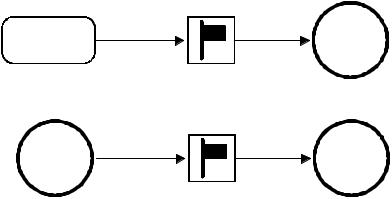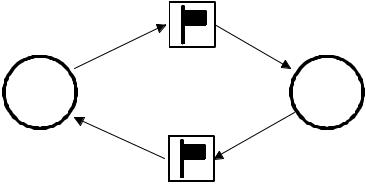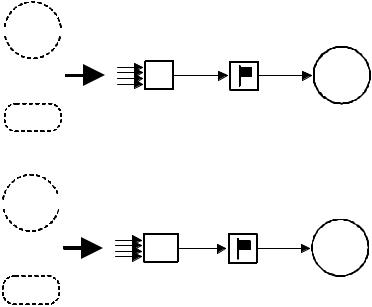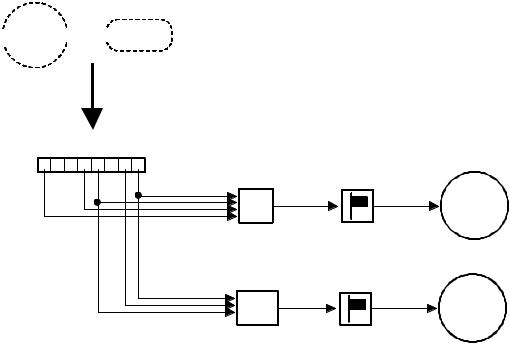
- •Preface
- •Introduction
- •1.01 INCLUDES.H
- •1.02 Compiler Independent Data Types
- •1.03 Global Variables
- •1.04 OS_ENTER_CRITICAL() and OS_EXIT_CRITICAL()
- •1.05 PC Based Services
- •1.05.01 PC Based Services, Character Based Display
- •1.05.02 PC Based Services, Elapsed Time Measurement
- •1.05.03 PC Based Services, Miscellaneous
- •1.07 Example #1
- •1.08 Example #2
- •1.09 Example #3
- •2.00 Foreground/Background Systems
- •2.01 Critical Section of Code
- •2.02 Resource
- •2.03 Shared Resource
- •2.04 Multitasking
- •2.05 Task
- •2.06 Context Switch (or Task Switch)
- •2.07 Kernel
- •2.08 Scheduler
- •2.09 Non-Preemptive Kernel
- •2.10 Preemptive Kernel
- •2.11 Reentrancy
- •2.12 Round Robin Scheduling
- •2.13 Task Priority
- •2.14 Static Priorities
- •2.15 Dynamic Priorities
- •2.16 Priority Inversions
- •2.17 Assigning Task Priorities
- •2.19 Mutual Exclusion
- •2.20 Deadlock (or Deadly Embrace)
- •2.21 Synchronization
- •2.22 Event Flags
- •2.23 Intertask Communication
- •2.24 Message Mailboxes
- •2.25 Message Queues
- •2.26 Interrupts
- •2.27 Interrupt Latency
- •2.28 Interrupt Response
- •2.29 Interrupt Recovery
- •2.30 Interrupt Latency, Response, and Recovery
- •2.31 ISR Processing Time
- •2.32 Non-Maskable Interrupts (NMIs)
- •2.33 Clock Tick
- •2.34 Memory Requirements
- •2.35 Advantages and Disadvantages of Real-Time Kernels
- •2.36 Real-Time Systems Summary
- •3.00 Critical Sections
- •3.01 Tasks
- •3.02 Task States
- •3.03 Task Control Blocks (OS_TCBs)
- •3.04 Ready List
- •3.05 Task Scheduling
- •3.06 Locking and Unlocking the Scheduler
- •3.07 Idle Task
- •3.08 Statistics Task
- •3.10 Clock Tick
- •3.14 OSEvent???() functions
- •4.00 Creating a Task, OSTaskCreate()
- •4.01 Creating a Task, OSTaskCreateExt()
- •4.02 Task Stacks
- •4.03 Stack Checking, OSTaskStkChk()
- •4.04 Deleting a Task, OSTaskDel()
- •4.05 Requesting to delete a task, OSTaskDelReq()
- •4.06 Changing a Task’s Priority, OSTaskChangePrio()
- •4.07 Suspending a Task, OSTaskSuspend()
- •4.08 Resuming a Task, OSTaskResume()
- •4.09 Getting Information about a Task, OSTaskQuery()
- •5.00 Delaying a task, OSTimeDly()
- •5.01 Delaying a task, OSTimeDlyHMSM()
- •5.02 Resuming a delayed task, OSTimeDlyResume()
- •5.03 System time, OSTimeGet() and OSTimeSet()
- •6.00 Event Control Blocks
- •6.01 Initializing an ECB, OSEventWaitListInit()
- •6.02 Making a task ready, OSEventTaskRdy()
- •6.03 Making a task wait for an event, OSEventTaskWait()
- •6.04 Making a task ready because of a timeout, OSEventTO()
- •6.05 Semaphores
- •6.06 Message Mailboxes
- •6.07 Message Queues
- •7.00 Memory Control Blocks
- •7.01 Creating a partition, OSMemCreate()
- •7.02 Obtaining a memory block, OSMemGet()
- •7.03 Returning a memory block, OSMemPut()
- •7.04 Obtaining status about memory partition, OSMemQuery()
- •7.05 Using memory partitions
- •7.06 Waiting for memory blocks from a partition
- •8.00 Development Tools
- •8.01 Directories and Files
- •8.02 INCLUDES.H
- •9.00 Development Tools
- •9.01 Directories and Files
- •9.02 INCLUDES.H
- •9.06 Memory requirements
- •9.07 Execution times
- •10.00 Directories and Files
- •10.01 INCLUDES.H
- •10.02.01 OS_CPU.H, Compiler specific data types
- •10.02.02 OS_CPU.H, OS_ENTER_CRITICAL() and OS_EXIT_CRITICAL()
- •10.02.03 OS_CPU.H, OS_STK_GROWTH
- •10.02.04 OS_CPU.H, OS_TASK_SW()
- •10.03.01 OS_CPU_A.ASM, OSStartHighRdy()
- •10.03.02 OS_CPU_A.ASM, OSCtxSw()
- •10.03.03 OS_CPU_A.ASM, OSIntCtxSw()
- •10.03.04 OS_CPU_A.ASM, OSTickISR()
- •10.04.01 OS_CPU_C.C, OSTaskStkInit()
- •10.04.02 OS_CPU_C.C, OSTaskCreateHook()
- •10.04.03 OS_CPU_C.C, OSTaskDelHook()
- •10.04.04 OS_CPU_C.C, OSTaskSwHook()
- •10.04.05 OS_CPU_C.C, OSTaskStatHook()
- •10.04.06 OS_CPU_C.C, OSTimeTickHook()
- •10.05 Summary
- •OSInit()
- •OSIntEnter()
- •OSIntExit()
- •OSMboxAccept()
- •OSMboxCreate()
- •OSMboxPend()
- •OSMboxPost()
- •OSMboxQuery()
- •OSMemCreate()
- •OSMemGet()
- •OSMemPut()
- •OSMemQuery()
- •OSQAccept()
- •OSQCreate()
- •OSQFlush()
- •OSQPend()
- •OSQPost()
- •OSQPostFront()
- •OSQQuery()
- •OSSchedLock()
- •OSSchedUnlock()
- •OSSemAccept()
- •OSSemCreate()
- •OSSemPend()
- •OSSemPost()
- •OSSemQuery()
- •OSStart()
- •OSStatInit()
- •OSTaskChangePrio()
- •OSTaskCreate()
- •OSTaskCreateExt()
- •OSTaskDel()
- •OSTaskDelReq()
- •OSTaskResume()
- •OSTaskStkChk()
- •OSTaskSuspend()
- •OSTaskQuery()
- •OSTimeDly()
- •OSTimeDlyHMSM()
- •OSTimeDlyResume()
- •OSTimeGet()
- •OSTimeSet()
- •OSTimeTick()
- •OSVersion()

2.20 Deadlock (or Deadly Embrace)
A deadlock, also called adeadlyembrace, is a situation in which two tasks are each unknowingly waiting for resources held by each other. If task T1 has exclusive access to resource R1 and task T2 has exclusive access to resource R2, then if T1 needs exclusive access to R2 and T2 needs exclusive access to R1, neither task can continue. They are deadlocked. The simplest way to avoid a deadlock is for tasks to:
a)acquire all resources before proceeding,
b)acquire the resources in the same order, and
c)release the resources in the reverse order.
Most kernels allow you to specify a timeout when ac quiring a semaphore. This feature allows a deadlock to be broken. If the semaphore is not available withing a certain amount of time, the task requesting the resource will resume execution. Some form of error code must be returned to the task to notify it that a timeout has occurred. A return error code prevents the task from thinking it has obtained to the resource. Deadlocks generally occur in large multitasking systems and are not generally encountered in embedded systems.
2.21 Synchronization
A task can be synchronized with an ISR, or another task when no data is being exchanged, by using a semaphore as shown in Figure 2-12. Note that, in this case, the semaphore is drawn as a flag, to indicate that it is used to signal the
occurrence of an event (rather than to ensure mutual exclusion, in which case it would be drawn as a key). When used as a synchronization mechanism, the semaphore is initialized to 0. Using a semaphore for this type of synchronization
is using what is called a unilateral rendezvous. A task initiates an I/O operation and then waits for the semaphore. When the I/O operation is complete, an ISR (or another task) signals the semaphore and the task is resumed.
ISR
TASK
POST |
PEND |
POST |
PEND |
TASK
TASK
Figure 2-12, Synchronizing tasks and ISRs.
If the kernel supports counting semaphores, the semaphore would accumulate events that have not yet been processed.
Note that more than one task can be waiting for the event to occur. In this case, the kernel could signal the occurrence of the event either to:
a)the highest priority task waiting for the event to occur, or
b)the first task waiting for the event.
Depending on the application, more than one ISR or task could signal the occurrence of the event.

Two tasks can synchronize their activities by using two semaphores, as shown in Figure 2-13. This is called abilateral rendezvous. A bilateral rendezvous is similar to a unilateral rendezvous except both tasks must synchronize with one another before proceeding.
POST |
PEND |
TASK |
TASK |
PEND |
POST |
Figure 2-13, Tasks synchronizing their activities.
For example, two tasks are executing as shown in listing 2.10. When the first task reaches a certain point, it signals the second task L2.10(1) and then waits for a signal from the second task L2.10(2). Similarly, when the second task reaches a certain point, it signals the first task L2.10(3) and then waits for a signal from the first task L2.10(4). At this point, both tasks are synchronized with each other. A bilateral rendezvous cannot be performed between a task and an ISR because an ISR cannot wait on a semaphore.
Task1() |
|
{ |
|
for (;;) { |
|
Perform operation; |
|
Signal task #2; |
(1) |
Wait for signal from task #2; |
(2) |
Continue operation; |
|
} |
|
} |
|
Task2() |
|
{ |
|
for (;;) { |
|
Perform operation; |
|
Signal task #1; |
(3) |
Wait for signal from task #1; |
(4) |
Continue operation; |
|
} |
|
} |
|
Listing 2.10, Bilateral rendezvous.
2.22 Event Flags

Event flags are used when a task needs to synchronize with the occurrence of multiple events. The task can be synchronized when any of the events have occurred. This is called disjunctive synchronization (logical OR). A task can also be synchronized when all events have occurred. This is called conjunctive synchronization (logical AND). Disjunctive and conjunctive synchronization are shown in Figure 2-14.
Common events can be used to signal multiple tasks, as shown in Figure 2-15. Events are typically grouped. Depending on the kernel, a group consists of 8, 16 or 32 events (mostly 32-bits, though). Tasks and ISRs can set or clear any event in a group. A task is resumed when all the events it requires are satisfied. The evaluation of which task will be resumed is performed when a new set of events occurs (i.e. during a SET operation).
Kernels supporting event flags offer services to SET event flags, CLEAR event flags, and WAIT for event flags (conjunctively or disjunctively). µC/OS-II does not currently support event flags.
 TASK
TASK 
Events |
Semaphore |
OR POST |
PEND TASK |
ISR
DISJUNCTIVE SYNCHRONIZATION
 TASK
TASK 
Events |
Semaphore |
|
AND POST |
PEND TASK |
|
ISR
CONJUNCTIVE SYNCHRONIZATION
Figure 2-14, Disjunctive and conjunctive synchronization.

 TASK
TASK 
 ISR
ISR
Events |
|
|
(8, 16 or 32 bits) |
|
|
Events |
|
Semaphore |
|
|
|
OR |
POST |
PEND |
|
|
|
Events |
|
Semaphore |
|
|
|
AND POST |
PEND |
|
TASK
TASK
Figure 2-15, Event flags.
2.23 Intertask Communication
It is sometimes necessary for a task or an ISR to communicate information to another task. This information transfer is called intertask communication . Information may be communicated between tasks in two ways: through global data or by sending messages.
When using global variables, each task or ISR must ensure that it has exclusive access to the variables. If an ISR is involved, the only way to ensure exclusive access to the common variables is to disable interrupts. If two tasks are sharing data each can gain exclusive access to the variables by using either disabling/enabling interrupts or through a semaphore (as we have seen). Note that a task can only communicate information to an ISR by using global variables. A task is not aware when a global variable is changed by an ISR unless the ISR signals the task by using a semaphore or by having the task regularly poll the contents of the variable. To correct this situation, you should con sider using either a message mailbox or a message queue.
